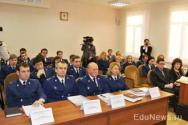Daniil Granin family children grandchildren. What is the writer Daniil Granin remembered for - Rossiyskaya Gazeta
Private bussiness
Daniil Alexandrovich Granin ( real name Herman, 1919—2017) born in the village of Volyn, Kursk province, in the family of a forester. When he was seven years old, he moved to Leningrad with his mother.
“A city-dwelling mother, a fashionista, young, beautiful, could not sit in the village,” Granin wrote in his autobiography. “I understand this now, in hindsight, understanding their nightly whispered arguments. And then everything was accepted as a blessing: the move to Leningrad, and the city school, father’s visits with baskets of lingonberries, flat cakes, and village melted butter. And all summer - in his forest, in the timber industry enterprise, in winter - in the city. ...Then everything was resolved by other circumstances - my father was sent to Siberia, somewhere near Biysk, and from then on we became Leningraders.”
Granin studied at school 15 on Mokhovaya Street in the center of Leningrad, where “there were still several teachers left from the Tenishev School that was here before the revolution, one of the best Russian gymnasiums.” In 1935 he graduated from school, worked as a driver for six months, then entered the Leningrad Electrotechnical Institute. For the last two years, he completed his studies at the Faculty of Electrical Engineering at the Leningrad Polytechnic Institute (his specialty was abolished at the previous university).
Having received a diploma in electrical engineering at hydroelectric stations, in 1940 he went to work at the Kirov plant, where he became a senior engineer and deputy secretary of the Komsomol committee.
In 1941, he went to the front as a volunteer as part of the factory people's militia. He fought on the Leningrad and Baltic fronts, ending the war in East Prussia as the commander of a tank company.
“If you mark, as if on a target, all the bullets, fragments whizzing around, all the mines, bombs, shells, then with what enchanted clarity my surviving figure would emerge in the broken air. Long after the war, I considered my existence a miracle and the post-war life I received as a priceless gift. In the war I learned to hate, kill, take revenge, be cruel and much more that a person does not need. But the war taught both brotherhood and love. The guy I was when I went to war seemed to me, after those four years, like a boy with whom I had little in common. However, I wouldn’t like the one who returned from the war today either. Just like I did to him,” Granin wrote in his autobiography in 1980.
After the war, he worked as the head of the regional cable network in Lenenergo, and participated in restoring the power supply to Leningrad. He attended graduate school at the Leningrad Polytechnic University and published several articles on electrical engineering.
For the first time Granin began to publish fiction back in the 1930s: in 1937, his first stories, “The Return of Rouliac” and “Motherland,” dedicated to the Paris Commune, were published in the magazine “Rezets”. He himself associated the beginning of professional literary work with the publication of a story about graduate students, “Option Two” (Zvezda magazine, 1949).
According to him, this story was “noted by critics, praised, and I decided that from now on it will go as it should: I will write, they will immediately publish me, praise, glorify, etc. Fortunately, the next story “The Dispute Across the Ocean,” published in the same “Star,” was severely criticized. Not for artistic imperfection, which would be fair, but for “admiration for the West,” which was precisely not there.”
In the 1950s, the writer’s first books were published - the stories “Dispute Across the Ocean” and “Yaroslav Dombrovsky”, a collection of essays about the builders of the Kuibyshev hydroelectric power station “New Friends” and the novel “Seekers” (1955). The latter brought fame to Granin and formed the basis for the 1956 film of the same name. The main character of the work was a scientist fighting bureaucracy.
Other works of the writer are also dedicated to the fate of scientists, including the novels “After the Wedding” (1958), “I’m Going into the Storm” (1962); biography of biologist Alexander Lyubishchev (“This strange life", 1974), physicist Igor Kurchatov ("Choice of Target", 1975) and geneticist Nikolai Timofeev-Resovsky ("Zubr", 1987).
“I wrote about engineers, scientists, scientists, about scientific creativity, this was my topic, my friends, my environment,” Granin said in his autobiography. “I didn’t have to study the material or go on creative trips. I loved these people - my heroes, although their lives were uneventful.”
Another important topic for the writer was war. In 1968, Granin’s story “Our Battalion Commander” was published, in 1976 - “Claudia Vilor” about the life of a prisoner of war. In 1977-1981, Granin, in collaboration with the Belarusian writer Ales Adamovich, wrote The Siege Book, a documentary chronicle of life in Leningrad during the war. It was published in cuts in Novy Mir in 1977, in full in 1984, and has been reprinted several times since then. The last time Granin presented a new edition of the book was in 2013.
Granin’s military prose also includes the novel “My Lieutenant” (2011), for which the writer received the “Big Book” literary award.
Works recent years written in the genre of memoirs. In addition to “My Lieutenant”, these are “Quirks of My Memory” (2009), “It Wasn’t Quite Like That” (2010) and “Conspiracy” (2012).
For a long time Granin studied social activities, was elected a member of the board and secretary of the Writers' Union of the RSFSR and the USSR, in 1989-1991 he was a people's deputy of the USSR. He stood at the origins of the creation of the Leningrad society "Mercy", headed the board of the charitable foundation named after D.S. Likhachev, and was one of the initiators of the creation of the Russian PEN Center.
Daniil Granin
What is he famous for?
A classic of Russian literature, known for his novels about scientists and inventors ("Seekers", "I'm Going into a Storm", "Bison"), memoirs and military prose. Granin’s main work is considered to be the “Siege Book,” written in collaboration with Ales Adamovich, an interview with 200 Leningraders who survived the siege, their diary entries, thoughts of the authors. The book has become a kind of monument to all those who survived the siege.
Granin was also a prominent social activist, served on the board of the Writers' Union of the RSFSR and the USSR, was one of the initiators of the creation of the Russian PEN Center in 1989, and at the end of perestroika he was a people's deputy of the USSR. He was one of the initiators of the creation of the Leningrad society "Mercy". He headed the Society of Friends of the Russian National Library and the board of the International Charitable Foundation. D. S. Likhacheva.
What you need to know
In 2014, inconsistencies were found in Granin’s biography. The writer himself noted more than once that he went to the front as a private with a militia division.
Literary critic Mikhail Zolotonosov questioned these data. He found documents according to which Granin went to war as a senior political instructor, that is, according to the critic, he was an officer with the rank of captain.
Granin Daniil Aleksandrovich (b. 1919) is the pseudonym of a Russian writer, screenwriter and public figure in the field of literature. The real name of Daniil Alexandrovich is German.
Publications of his works first fell into the hands of readers in the post-war years. In 1989 he was awarded the title of Hero of Socialist Labor, and in 2005 he became an Honorary Citizen of St. Petersburg. In addition, the writer keeps other awards for services in the field of literature, art and architecture. Participant of the Second World War.
Read below short biography Daniil Granin.
Family, birth and education of the writer
The village of Volyn, where the writer was born, was located not far from the area where his father worked as a forester. However, Daniil Alexandrovich himself indicates another date of birth - 01/01/1919, and place of birth - Volsk, Saratov region. His mother was from a Tatar family, and his father was of Polish origin, possibly of Jewish blood. The writer's father was twenty years older than his mother. He remembered her melodious voice and the fact that she sewed on a sewing machine.
After moving to St. Petersburg with his mother, at the age of seven, he entered school. Granin's father was exiled to Siberia. According to the official version, Daniil studied at the Leningrad Polytechnic University, after which he worked at the Kirov Plant as an engineer. Then the biography of Daniil Granin for some time consisted mainly of military service- he was called up to war as a member of the people's militia. He was sent to a tank school in Ulyanovsk. According to Zolotonosov’s information published on the Internet under the title “Feat of the People in the Second World War. 1941-1945,” Daniil Granin worked as deputy. Secretary of the Komsomol, and served at the front as a commissar.
According to the recollections of the author himself, during his studies at the institute, he suddenly began working on historical work about Dombrowski, in which he expressed his attitude to the uprising in Poland in 1863, and the life of the French in the commune. During the period of participation in hostilities in Pulkovo Heights he did not describe the war, because he believed that war does not teach anything good - there is too much blood and cruelty.
Work and creativity in the biography of Daniil Granin
While on duty in Ulyanovsk, he meets citizen Mayorova and subsequently marries her. In the year the war ended, Marina was born into their family. Upon returning to Leningrad, Granin works to restore the city's power lines, destroyed during the siege. While working at Lenenergo, the writer began his writing career with a collection of short stories, “Dispute Across the Ocean,” published in 1949. During the same period, Granin’s story “Option Two” was published, published in “Zvezda” not without the support of Yu. German, who did not have family ties with Daniil Alexandrovich. But the author took the pseudonym Granin to avoid misinterpretation of his relationship with the head of the press department.
After 1950, he became a professional writer and an expert in the field of literature. He published a story about J. Dombrowski, begun in the pre-war years. The work “The Victory of Engineer Korsakov” told about the victory in scientific research of a Soviet scientist in a discussion with a representative of the US scientific community. The leadership of the USSR did not like the work, since the USA was not presented gloomily enough. Further creative biography Daniil Granin developed in the field of scientific developments. He enters graduate school, studying the movement of electric arcs. In his works, Daniil Granin deeply touches on the topic of scientific and technological progress and the realities of everyday work. His work resonates in the hearts of the scientific world of the USSR, which have always been the target of the leadership, officials, short-sighted and thirsty for profit. Granin reveals the topic of obstacles to the movement of science forward from the outside statesmen.
If you have already read the short biography of Daniil Granin, you can rate this writer at the top of the page. In addition, we bring to your attention the Biographies section, where you can read about other writers, in addition to the biography of Daniil Granin.
Daniil Aleksandrovich Granin is a famous Soviet and Russian film screenwriter, writer, public figure. He was awarded several prestigious literary awards. He became widely known thanks to the books “This Strange Life”, “Bison”, “The Blockade Book”, “The Three Loves of Peter the Great”, “My Lieutenant”. In this article we will talk about the life and work of the writer.
Daniil Granin: biography. Birth
The future writer was born on January 1, 1919. The author's place of birth is not known for certain. According to one version, this event occurred in the village of Volyn (Kursk region). According to another - in the Saratov region.
His father, Alexander Danilovich German (this is the real name of the writer), worked as a forester. Because of this, the family often moved from one forestry to another. The difference between the spouses was very large - Anna Bakirovna was twenty years younger than her husband. The woman had a beautiful voice and often sang to her son.
Two childhoods
Daniil Granin wrote, remembering early years that he had two childhoods - forest and city. The first was associated with snowy winter, rivers and mother's stories about the mountains. The second - with shootings, fires, the end of the Civil War, spontaneous uprisings and rampant gangs. Despite the fact that these were completely different worlds, the writer carried through his entire life the same love for them.

For little Daniel, life in the village was almost idyllic. However, Anna Bakirovna, a city dweller by birth, was bored in the countryside. For her, moving to Leningrad was real happiness. And for her son, a city childhood began. The parents lived separately - the father did not leave his job. Therefore, the boy spent his summer in the forest, and in winter he returned to the city. Each of the parents wanted to win Daniel over to their side as the eldest son. But this confrontation quickly ended. Soon the father was exiled to Siberia, and the family remained to live in Leningrad. Anna Bakirovna earned her living by sewing, but this was not enough to feed her family, and they often lived in poverty.
Daniil Granin was very happy when his father was able to return from exile. But Alexander Danilovich became “disenfranchised,” that is, he could not live in a large city. And they refused to accept his son into the Komsomol.
The future writer graduated from school on Mokhovaya, where there were still teachers who worked here before the revolution. Little Daniel especially liked literature lessons.
Engineer

Despite the fact that Daniil Granin was actively interested in history and literature, at the family council it was decided that the specialty of engineer was more prestigious. Therefore, the future writer entered the Polytechnic Institute at the Faculty of Electrical Engineering. This educational institution he graduated successfully in 1940. At first, Granin was attracted by the new specialty. In those years, the fields of automation, energy and the construction of hydroelectric power stations were shrouded in romanticism, and legends circulated about the scientists who worked in these areas.
The engineering industry was well funded. Therefore, during his student years, Daniil Aleksandrovich went to practice in the Caucasus, at the Dnieper Hydroelectric Station, where he worked as a repairman, an installer, and an attendant at control panels. Already in his fifth year, Granin began writing a historical story, the main character of which was Yaroslav Dombrovsky. The work mentioned the events of the Polish uprising of 1863, and also described the Paris Commune. However, the young author was very ashamed of his hobby and did not tell anyone about it.
The Great Patriotic War
After graduating from the institute, Daniil Aleksandrovich Granin was sent to the Kirov Plant as a designer.
But soon the Great Patriotic War began, which changed life young man- He joined the people's militia. We had to get a ticket to the front, because engineers were in demand in the rear. During the war years, Granin visited the Leningrad and Baltic fronts, was an infantryman and a tank driver. At the end of the battles, writer Daniil Granin rose to the rank of company commander heavy tanks.
During the Great Patriotic War, the young man met his love. The relationship was registered right at the front. Immediately after the wedding, the alarm was declared, and the couple sat in a bomb shelter for several hours. In 1945, their daughter Marina was born.

Post-war time
Daniil Granin perceived post-war life as a gift of fate. And it was not only the end of the battles, but also the fact that he was finally able to declare that he was a writer. Almost immediately after returning from the front, he was accepted into the Writers' Union.
Despite this, Granin perceived literature only as a hobby, not thinking that he would ever become a professional writer. His main activity was related to Lenenergo, which needed restoration after the war.
Literary activity
Daniil Granin began to show an active interest in writing. The writer's stories began to be published in 1948. It was this year that Zvezda published his work “Option Two.” Critics praised the ease and simplicity of the language. The author was very happy about the flattering reviews and decided that now he would always be praised.
But the expectations were not met. And according to Granin himself, for the better. His very next story, “The Dispute Across the Ocean,” published again in Zvezda, was subjected to harsh criticism. And they accused him not of artistic imperfection, but of “admiration of the West.” The accusations were unfounded, which surprised and upset the author.

Choice
Daniil Granin, whose books have already begun to be published, decides to enroll in graduate school at the Polytechnic Institute. And at the same time he begins to write the novel “The Searchers.” But as time passed, it became clear that both of these things required too much time. Granin was faced with a choice. The success that came to him after the publication of “Seekers” played a decisive role. Literature seemed like the best option. However, the writer could not quit graduate school and forget about his engineering education for a long time.
Granin began to write about what he knew well - engineers, scientists, scientific creativity. From that time on, literature ceased to be a simple hobby.
- "Bison";
- "Siege Book";
- "It's a Strange Life";
- "After the wedding";
- "Flight to Russia";
- "Painting";
- “Namesame”, etc.
Afterword

One of the most famous prose writers in our country is Daniil Granin. The writer’s books can be found today in almost any library or bookstore. But now we know that the author’s fate could have turned out differently if he had decided to follow the path of a scientist rather than a creator.
However, Daniil Alexandrovich is famous not only for his works, but also for his social activities. He actively contributed to the development of the Relief Society movement in Russia. This outstanding person was elected as a people's deputy more than once. However, he was left with one disappointment from his political activities - it turned out to be much more difficult to benefit society than he thought.
Today the writer lives in St. Petersburg and continues to work. Granin's wife, Rimma Mikhailovna Mayorova, passed away in 2004.
Born in 1919. Father - German Alexander Danilovich, was a forester. Mother - Anna Bakirovna. Wife - Mayorova R. M. (born 1919). Daughter - Chernysheva Marina Danilovna (born 1945).
The parents lived together in different forest districts of the Novgorod and Pskov regions. My father was twenty years older than my mother. She had a good voice and spent her entire childhood singing.
There were snowy winters, shootings, fires, river floods - the first memories are mixed with the stories I heard from my mother about those years. In my native places it was still burning out Civil War, gangs ran rampant, riots broke out. Childhood was bifurcated: at first it was in the forest, later - in the city. Both of these streams, without mixing, flowed for a long time and remained separate in D. Granin’s soul. Childhood in the forest is a bathhouse with a snowdrift, where a steaming father and men jumped, winter forest roads, wide homemade skis (and city skis are narrow, which they used to walk along the Neva all the way to the bay). I remember best the mountains of fragrant yellow sawdust near the sawmills, the logs, the passages of the timber exchange, the tar mills, and the sleighs, and the wolves, the comfort of the kerosene lamp, the trolleys on the flat roads.
The mother - a city dweller, a fashionista, young, cheerful - could not sit in the village. Therefore, she perceived the move to Leningrad as a blessing. For the boy, an urban childhood flowed - studying at school, his father's visits with baskets of lingonberries, flat cakes, and village melted butter. And all summer - in his forest, in the timber industry enterprise, in winter - in the city. As the eldest child, he, the first-born, was drawn to each other. It was not a disagreement, but a different understanding of happiness. Then everything was resolved in a drama - the father was exiled to Siberia, somewhere near Biysk, the family remained in Leningrad. Mother worked as a dressmaker. And I made money doing the same at home. Ladies appeared - they came to choose a style, try them on. Mother loved and did not love this work - she loved it because she could show her taste, her artistic nature, she did not love it because they lived poorly, she could not dress herself, her youth was spent on other people's outfits.
After exile, my father became “disenfranchised”; he was forbidden to live in big cities. D. Granin, as the son of a “disenfranchised”, was not accepted into the Komsomol. He studied at school on Mokhovaya. There were still a few teachers left there from the Tenishev School, which was located here before the revolution - one of the best Russian gymnasiums. In the physics classroom, students used instruments from the Siemens-Halske era on thick ebonite panels with massive brass contacts. Every lesson was like a performance. Professor Znamensky taught, then his student Ksenia Nikolaevna. The long teaching table was like a stage where an extravaganza was played out with the participation of a beam of light laid out in prisms, electrostatic machines, discharges, vacuum pumps.
The literature teacher had no apparatus, nothing but a love of literature. She organized a literary club, and most of the class began to write poetry. One of the best school poets became a famous geologist, another became a mathematician, and the third became a specialist in the Russian language. Nobody became a poet.
Despite his interest in literature and history, the family council recognized that engineering was a more reliable profession. Granin entered the electrical engineering department of the Polytechnic Institute, from which he graduated in 1940. Energy, automation, construction of hydroelectric power stations were then professions full of romance, like later atomic and nuclear physics. Many teachers and professors also participated in the creation of the GOELRO plan. There were legends about them. They were the pioneers of domestic electrical engineering, they were capricious, eccentric, each allowed himself to be an individual, have his own language, communicate his views, they argued with each other, argued with accepted theories, with the five-year plan.
Students went to practice in the Caucasus, at the Dnieper Hydroelectric Station, worked on installation, repair, and were on duty at control panels. In his fifth year, in the midst of his thesis, Granin began to write historical story about Yaroslav Dombrovsky. He wrote not about what he knew, what he was doing, but about what he did not know and did not see. There was the Polish uprising of 1863 and the Paris Commune. Instead of technical books, he subscribed to albums with views of Paris from the Public Library. Nobody knew about this hobby. Granin was ashamed of writing, and what he wrote seemed ugly and pitiful. But he could not stop.
After graduation, Daniil Granin was sent to the Kirov plant, where he began to design a device for finding faults in cables.
From the Kirov plant he went to the people's militia, to the war. However, they were not allowed in right away. I had to work hard to get the reservation cancelled. The war passed for Granin without letting go for a day. In 1942, at the front, he joined the party. He fought on the Leningrad Front, then on the Baltic Front, was an infantryman, a tank driver, and ended the war as the commander of a company of heavy tanks in East Prussia. During the war days, Granin met love. As soon as they managed to register, the alarm was announced, and they sat, now husband and wife, for several hours in a bomb shelter. So it began family life. This was interrupted for a long time, until the end of the war.
I spent the entire winter of the siege in the trenches near Pushkino. Then he was sent to a tank school and from there he was sent to the front as a tank officer. There was shell shock, there was encirclement, a tank attack, there was a retreat - all the sorrows of war, all its joys and its dirt, I drank in everything.
Granin considered the post-war life he had received as a gift. He was lucky: his first comrades in the Writers' Union were front-line poets Anatoly Chivilikhin, Sergei Orlov, Mikhail Dudin. They accepted the young writer into their loud, cheerful community. And besides, there was Dmitry Ostrov, an interesting prose writer, whom Granin met at the front in August 1941, when on the way from the regimental headquarters they spent the night together in the hayloft, and woke up to find that there were Germans all around...
It was to Dmitry Ostrov that Granin brought his first completed story about Yaroslav Dombrovsky in 1948. Ostrov, it seems, never read the story, but nevertheless convincingly proved to his friend that if you really want to write, then you need to write about your engineering work, about what you know, how you live. Now Granin advises this to young people, apparently having forgotten how dull such moral teachings seemed to him then.
The first post-war years were wonderful. At that time, Granin had not yet thought of becoming a professional writer; literature was just pleasure, relaxation, and joy for him. In addition to this, there was work - in Lenenergo, in the cable network, where it was necessary to restore the city’s energy sector destroyed during the blockade: repair cables, lay new ones, put substations and transformer facilities in order. Every now and then there were accidents, there was not enough capacity. They got me out of bed, at night - an accident! It was necessary to throw light from somewhere, to obtain energy for extinguished hospitals, water supply systems, and schools. Switch, repair... In those years - 1945-1948 - cable workers, power engineers, felt like the most necessary and influential people in the city. As the energy sector was restored and improved, Granin’s interest in operational work faded. The normal, trouble-free regime that was sought caused satisfaction and boredom. At this time, experiments on so-called closed networks began in the cable network - calculations of new types of electrical networks were tested. Daniil Granin took part in the experiment, and his long-standing interest in electrical engineering was revived.
At the end of 1948, Granin suddenly wrote a story about graduate students. It was called "Option Two". Daniil Alexandrovich brought it to the Zvezda magazine, where he was met by Yuri Pavlovich German, who was in charge of prose in the magazine. His friendliness, simplicity and captivating ease of attitude towards literature greatly helped the young writer. Yu. P. German's lightness was a special quality, rare in Russian literary life. It consisted in the fact that he understood literature as a fun, happy thing with the purest, even holy, attitude towards it. Granin was lucky. Then he never met anyone with such a festive and mischievous attitude, such pleasure, pleasure from literary work. The story was published in 1949, almost without amendments. He was noticed by critics, praised, and the author decided that from now on it would go like this, that he would write, he would immediately be published, praised, glorified, etc.
Fortunately, the next story, “A Dispute Across the Ocean,” published in the same “Star,” was severely criticized. Not for artistic imperfection, which would be fair, but for “admiration for the West,” which was precisely not there. This injustice surprised and outraged Granin, but did not discourage him. It should be noted that engineering work created a wonderful sense of independence. In addition, he was supported by the honest exactingness of senior writers - Vera Kazimirovna Ketlinskaya, Mikhail Leonidovich Slonimsky, Leonid Nikolaevich Rakhmanov. In Leningrad in those years, a wonderful literary environment still remained - Evgeniy Lvovich Schwartz, Boris Mikhailovich Eikhenbaum, Olga Fedorovna Berggolts, Anna Andreevna Akhmatova, Vera Fedorovna Panova, Sergei Lvovich Tsimbal, Alexander Ilyich Gitovich were alive - the diversity of talents and personalities that so necessary in youth. But perhaps what helped Granin most of all was the sympathetic interest of Taya Grigorievna Lishina in everything he did, her deep-voiced ruthlessness and absolute taste... She worked in the Propaganda Bureau of the Writers' Union. Many writers are indebted to her. In her little room, new poems were constantly being read, stories, books, magazines were being discussed...
Soon, Daniil Granin entered graduate school at the Polytechnic Institute and at the same time began writing the novel “The Searchers.” By that time, the long-suffering book “Yaroslav Dombrovsky” had already been published. At the same time, Granin also studied electrical engineering. He published several articles and moved on to the problems of the electric arc. However, these mysterious, interesting activities required time and complete immersion. When I was young, when I had a lot of energy and even more time, it seemed that it was possible to combine science and literature. And I wanted to combine them. Each of them pulled towards herself with greater strength and jealousy. Each one was beautiful. The day came when Granin discovered a dangerous crack in his soul. It's time to choose. Or either. The novel "The Searchers" was published and was a success. There was money, and I could stop holding on to my postgraduate scholarship. But Granin procrastinated for a long time, waited for something, gave lectures while working part-time, and did not want to tear himself away from science. I was afraid, didn’t believe in myself... In the end it happened. Not going into literature, but leaving the institute. Subsequently, the writer sometimes regretted that he had done it too late, that he began to write seriously and professionally late, but sometimes he regretted that he had given up science. Only now Granin begins to comprehend the meaning of the words of Alexandre Benois: “The greatest luxury that a person can afford is to always do as he wants.”
Granin wrote about engineers, scientists, scientists, about scientific creativity - all this was his theme, his environment, his friends. He didn’t have to study the material or go on creative business trips. He loved these people - his heroes, although their lives were uneventful. It was not easy to portray her inner tension. It was even more difficult to introduce the reader to their work, so that the reader understood the essence of their passions and so as not to attach diagrams and formulas to the novel.
The 20th Party Congress was the decisive milestone for Granin. He made me see the war, myself, and the past differently. In a different way - it meant seeing the mistakes of the war, appreciating the courage of the people, the soldiers, and themselves...
In the 60s, it seemed to Granin that the successes of science, and above all physics, would transform the world and the destinies of mankind. Physicists seemed to him to be the main heroes of that time. By the 70s, that period was over, and as a sign of farewell, the writer created the story “The Namesake,” in which he somehow tried to comprehend his new attitude towards his former hobbies. This is not a disappointment. This is getting rid of unnecessary hopes.
Granin also experienced another hobby - traveling. Together with K. G. Paustovsky, L. N. Rakhmanov, Rasul Gamzatov, Sergei Orlov, they went on a cruise around Europe in 1956 on the motor ship "Russia". For each of them, this was the first trip abroad. Yes, not to one country, but to six at once - it was the discovery of Europe. Since then, Granin began to travel a lot, traveling far, across oceans - to Australia, Cuba, Japan, and the USA. For him it was a thirst to see, understand, compare. He had the opportunity to go down the Mississippi on a barge, wander through the Australian bush, live with a country doctor in Louisiana, sit in English taverns, live on the island of Curacao, visit many museums, galleries, temples, visit different families - Spanish, Swedish, Italian. The writer managed to write about something in his travel notes.
Gradually life focused on literary work. Novels, stories, scripts, reviews, essays. The writer tried to master different genres, including science fiction.
They say that the biography of a writer is his books. Among the novels written by D. A. Granin are: “The Siege Book” (co-authored with A. Adamovich), “Bison”, “This Strange Life”. The writer managed to say something about the Leningrad blockade that no one said, to talk about two great Russian scientists whose fate was hushed up. Other works include the novels “The Seeker,” “I’m Going into the Storm,” “After the Wedding,” “The Painting,” “Escape to Russia,” “The Namesake,” as well as journalistic works, scripts, and travel notes.
D. A. Granin - Hero of Socialist Labor, laureate of the State Prize, holder of two Orders of Lenin, Orders of the Red Banner, Red Banner of Labor, Red Star, two orders Patriotic War II degree, Order of Merit for the Fatherland, III degree. He is a laureate of the Heinrich Heine Prize (Germany), a member of the German Academy of Arts, an honorary doctor of the St. Petersburg Humanitarian University, a member of the Academy of Informatics, a member of the Presidential Council, and President of the Menshikov Foundation.
D. Granin created the country's first Relief Society and contributed to the development of this movement in the country. He was repeatedly elected to the board of the Writers' Union of Leningrad, then of Russia, he was a deputy of the Leningrad City Council, a member of the regional committee, and during the time of Gorbachev - a people's deputy. The writer was convinced with his own eyes that political activity not for him. All that was left was disappointment.
Enjoys sports and travel.
Lives and works in St. Petersburg.
Granin Daniil Alexandrovich (b. 1918), present. surname German - Russian writer.
Born on January 1, 1918 in the village of Volyn (now Kursk region) in the family of a forester. In 1940 he graduated from the electromechanical department of the Leningrad Polytechnic Institute (where after the war he studied in graduate school); worked as an engineer at the Kirov plant. In 1941 he went to the front with the people's militia, rising from a soldier to a company commander. After the war, he worked at Lenenergo and published articles in scientific and technical periodicals.
Most people don't try to go beyond their limits; throughout their lives they never try to find out what they are capable of and what they are incapable of. They don't know what they can't do. It's a shame to live life without recognizing yourself - the person who seemed closest to you and whom you loved so much.
Granin Daniil Alexandrovich
Literary activity began in 1937 with the stories The Return of Rouliac and the Motherland (on their basis in 1951 the story about the hero of the Paris Commune, J. Dombrowski, General of the Commune, was created). Granin's main theme - romance and the risk of scientific research - was defined by the writer in the story Option Two (1949), which also outlined the main aspect of its consideration in the writer's work: the moral choice of a scientist, especially relevant in the era of the scientific and technological revolution and technocratic illusions. Here the young scientist refuses to defend his dissertation because in the work of the deceased researcher he discovered, the sought-after problem was solved more effectively. In the story Victory of Engineer Korsakov (published in 1949 under the title Dispute across the Ocean), written not without the influence of the then patriotic officialdom, the Soviet scientist defeats his American colleague in a correspondence polemic.
The contrast between genuine scientists, selfless innovators and lovers of truth, and self-interested careerists is the central conflict of the novels The Seekers (1954, film of the same name, 1957; director M.G. Shapiro) and especially I’m Going into the Storm (1962, film of the same name, 1966, script by Granin and director. S.G. Mikaelyan), one of the first to give a new, “thaw” breath to the Soviet “industrial novel”, combining the acuteness of research problems, the poetry of the movement of thought and the invasion of the world of “physicists”, shrouded in a haze of mystery and respectful admiration, with a lyrical and confessional tonality and social criticism of the “sixties”.
Freedom of personal expression in the fight against all levels of authoritarian power is affirmed by the writer in the story Own Opinion (1956), as well as in the novel After the Wedding (1958, film of the same name directed by M.I. Ershov) and the story Someone Must (1970), in which Granin’s desire to connect the spiritual formation of the hero with the purpose of his work - as usual, manifested in the scientific and production sphere - draws a chain reaction of meanness, and, betraying the ideological romanticism characteristic of early Granin, does not find an optimistic way out.
The attraction to documentary evidence manifested itself in Granin’s numerous essays and diaries (including in the books Unexpected Morning, 1962; Notes to the guidebook, 1967; Rock Garden, dedicated to his impressions of trips to Germany, England, Australia, Japan, France and other countries). , 1972, etc.), as well as in biographical stories - about Polish revolutionary democrat and the commander-in-chief of the armed forces of the Paris Commune (Yaroslav Dombrovsky, 1951), about the biologist A.A. Lyubishchev (This Strange Life, 1974), about the physicist I.V. Kurchatov (Choice of Target, 1975), about the geneticist N.V. Timofeev- Resovsky (Zubr, 1987), about the French scientist F. Arago (The Tale of One Scientist and One Emperor, 1971), about difficult fate one of the participants in the Great Patriotic War, K.D. Burim (Clavdia Vilor, 1976), as well as in essays about Russian physicists M.O. Dolivo-Dombrovsky (Far Feat, 1951) and V. Petrov (Reflections in front of a portrait that does not exist, 1968).
Event in public life country was the appearance of Granin’s main documentary work - the Siege Book (1977-1981, jointly with A.A. Adamovich), based on authentic evidence, written and oral, of residents of besieged Leningrad, full of thoughts about the price of human life.
Journalism and restrained linguistic energy of writing, combined with the constant affirmation of a “non-utilitarian” and precisely because of this, simultaneously “kind” and “beautiful” attitude towards man, his work and the art he created, are also characteristic of Granin’s philosophical prose - the novel Painting (1980), lyrical - and socio-psychological stories about modernity: Rain in a Strange City (1973), Namesake (1975), Return Ticket (1976), The Trace is Still Visible (1984, dedicated to war memories), Our Dear Roman Avdeevich (1990).








